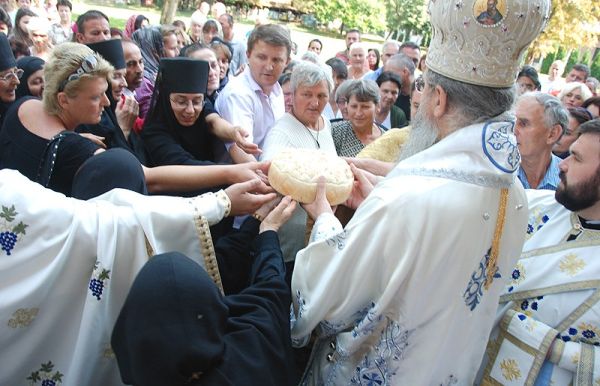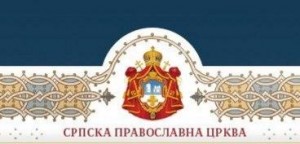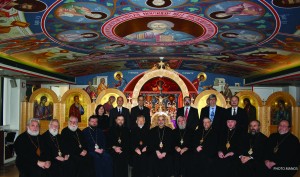“O love the Lord, all ye his saints,” – Psalm 30 (31):24
Of all the nations who have found their way to our shores, the Serbian people have perhaps the best sense of remembrance of any single group. Throughout the golden age of Serbian Orthodox history, faithful Serbs could be found erecting churches and celebrating memorials on the sites of the martyrdom of their countrymen. During periods of spiritual falling away (such as during the Communist period), even some of the most secular Serbs could be found marking Christ’s Nativity with outdoor bonfires (the burning of the badnjak, or yule log), and acknowledging Saint Sava, the founder of Serbian national and spiritual identity.
Perhaps no holiday is more unique to the Serbian Orthodox than the feast of the family patronal saint, called the Slava (literally, “glory”). Rooted in the very beginnings of the conversion of Serbian families and clans to Orthodox Christianity, the Slava marked the day of the baptism of the family ancestors, and has been passed down from one generation to the next, as an annual observance not simply of community spirit, but of the unbroken chain of generations passing on the Orthodox faith.
One Serb described the essentials for marking the family patronal feast day in the most basic terms: bread, wine, a candle, and a prayer – the essential elements for the sustenance of human life, joy, and life eternal. With these simple ingredients, any faithful Serb can mark his family Slava, at home or in exile, in wartime or in peacetime, in freedom or in prison. Many Serbs have had to endure these conditions for the sake of their faith, of course: their determination to celebrate the Slava, at all costs, is a tangible reminder that authentic faith has little to do with theological knowledge, and everything to do with the will of the heart. The lesson of Serbian faithful should not be missed by North Americans.
It should be no surprise that some Orthodox Christians in North America have embraced the concept of the Serbian Slava. For those who come to the Orthodox Faith as adults, often amid families who are outside the Church or even hostile to it, the idea of a special family feast day marking the date of entry into the Church is most appealing. The association of a particular patron saint – perhaps a saint of significance based on the ancestry of the family, their work, or their struggles – is an added encouragement, making tangible the unbroken connection of Orthodox faithful today with the saints and martyrs of ancient times.

Blessing of the slavski kolač (the Slava cake). Photo by www.pravoslavie.ru
The practice of adopting a patron saint’s Slava is a beautiful and appropriate one for adult converts to the Orthodox faith, yet it can be somewhat confusing to the Serbs who have guarded the tradition safely as their own through the centuries. One warm-hearted old Serbian gentleman, upon hearing about converts to the Orthodox faith marking a patron saints day, once asked, “So, why did they want to become Serbs?”. One might ask in reply, “Why not?”.
Of course, most North Americans have not inherited or been trained in the interior constitution that has allowed Orthodox Christianity to endure among the Serbs: most of us simply aren’t up for the challenge. Yet while the celebration of a family patron saint’s Slava might strike most Serbs as a strange thing for North Americans to observe, it is in fact a tribute to a spiritual inheritance of a people who have known martyrdom firsthand, and in living memory (ask any Serb about the nearly one million Orthodox martyrs who refused to deny their faith during the Second World War).
Without knowing it, the Serbian emigrées to the west have brought with them not only an inheritance, but the gift of missionary zeal: a living faith that has withstood trials and war, imprisonment and atheism, along with modern secularism. Those of us who have received this Christ-bearing inheritance from the longsuffering Serbian people have been blessed with a practical lesson of a living faith, wrapped not in dry academic sophistication, but rather in the joys, sorrows, martyrdom, and resurrection of the nation of which all faithful Orthodox are members: the Kingdom of Christ.
Without doubt, the Lord will bless and strengthen the Serbian people, who – even unknowingly – continue to pass on this inheritance. Let us pray that those who follow in their footsteps are made worthy to do so.
Source: Orthodox Canada: A Journal of Orthodox Christianity



















